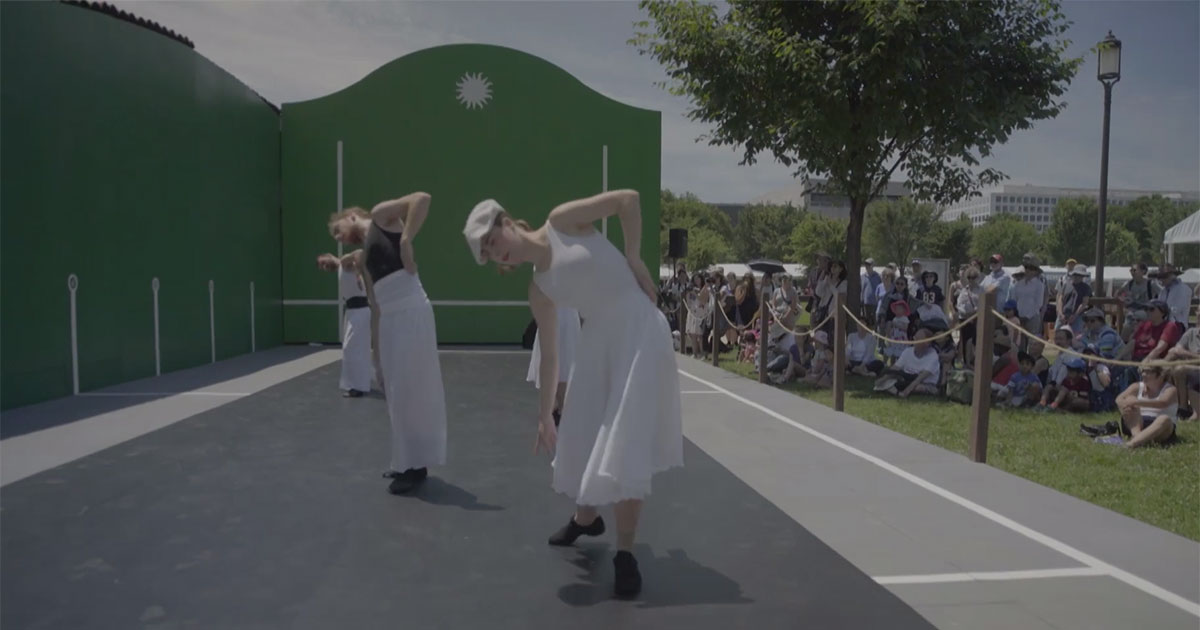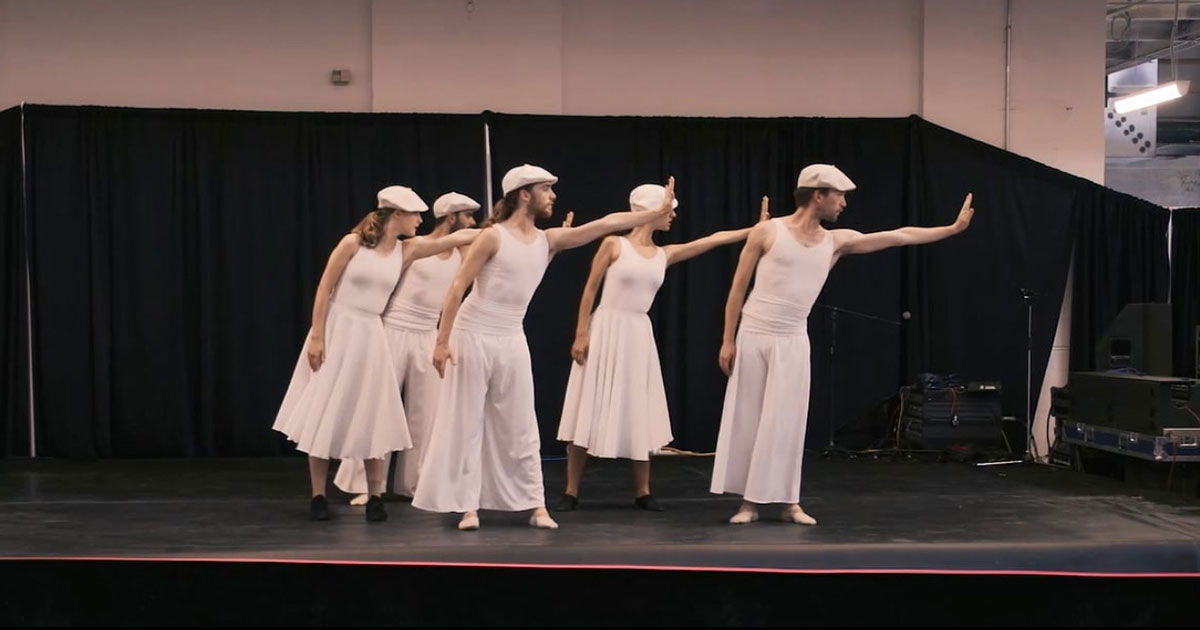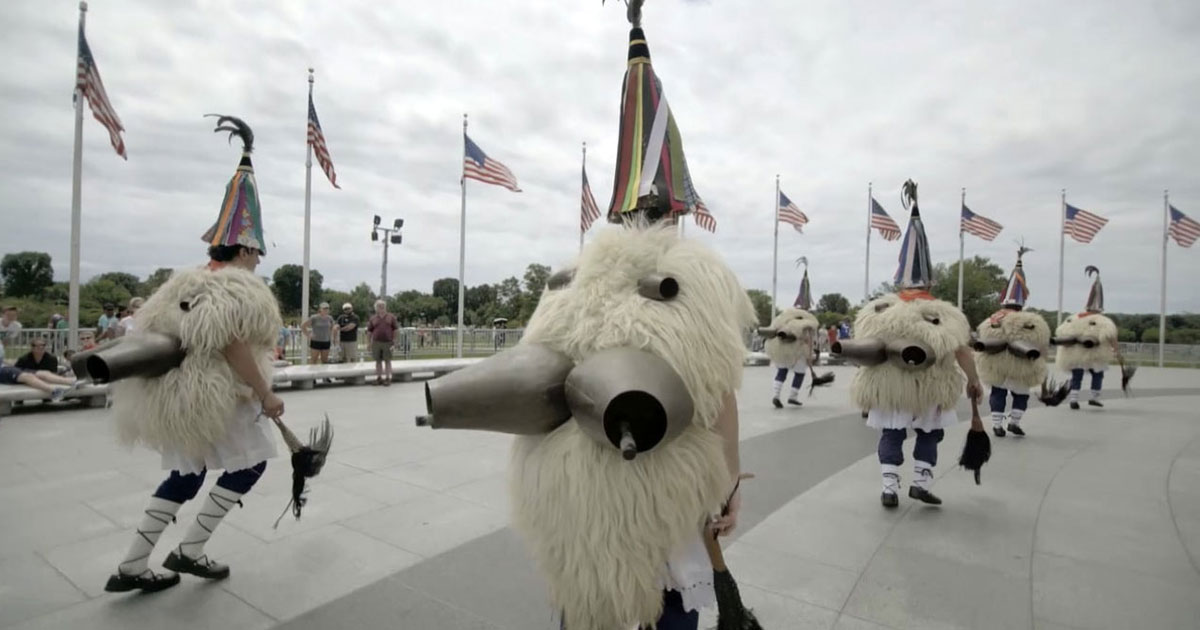
Basque dance has evolved through the centuries from ceremonial traditions to social village customs. Some dances, like the aurresku, performed by a single dancer, are used for official ceremonies to show reverence, while others like the romerías invite spontaneous crowd participation. Over the last two decades, Basque dance and processional traditions have shifted from distinct regional variations to more standardized movements.
For many Basque Americans, dance is a way to connect with their heritage, and many Basque clubs in the United States sponsor one or more dance groups for youth and adults. Meanwhile, contemporary dance ensembles innovate on traditional dance steps to create new movements, while always keeping historical contexts in focus.
Eight dance troupes from Basque country and the United States shared their various traditions through performances and workshops at the Folklife Festival. Read short profiles below.







Aukeran
The Aukeran dance company was formed in 1997 by dancer and choreographer Edu Muruamendiaraz. Their choreography is a blend of traditional and contemporary Basque dance, using stylized traditional dress.


Basque Dancers of the Great Basin
The Basque Dancers of the Great Basin are composed of two groups: the Elko Arinakand Ruby Mountain Ardi Baltza Basque Dancers, who have come together to perform at the Folklife Festival. The group is currently composed of young dancers aged thirteen to twenty-eight who have grown up performing together. They work to include as many different regional styles as possible, incorporating both traditional and original choreography.
Gauden Bat
Gauden Bat, meaning “let us be one,” is based at the Chino Basque Club in Southern California. Since 1932, they have striven to promote and preserve Basque culture and are now a unifying force in maintaining cultural awareness for young Basque Americans. Dancers in the group range from age fourteen to thirty.
Joaldunak
The iconic Joaldunak procession, rooted in pre-Christian ritual and now heralding the arrival of Carnaval, is performed in two villages in northern Nafarroa: Ituren and Zubieta. The men, and now women, wear elaborate costumes including a conical hat decorated with multicolored ribbons and feathers, large sheepskins, and four copper bells—two large and two small—tied securely to the joaldun’s back.
The processions take place over two days, the Monday and Tuesday after the last Sunday in January. The processors walk with a rhythmic step, making the bells on their backs resound. The hartza, a bear character, and the shepherd liven up the celebration and keep order. Although the origin of the procession is unknown, it is closely linked to the identity and cultural heritage of these two villages, where everyone participates in the food, music, and revelry.

Kern County Basque Club
Dantzari Gazteak
Formed in Bakersfield, California, in 1944, the Kern County Basque Club is the second largest Basque cultural club in the United States. The club’s Dantzari Gazteak group is composed of both men and women from all generations, starting as young as kindergarten. The group performs throughout the year at several Basque American celebrations, including Jaialdi, annual events of the North American Basque Organization, the Bakersfield Basque picnic, and wedding ceremonies.
Oinkari Basque Dancers
Oinkari Dantzari Taldea is a traditional dance troupe based in Boise, Idaho. In 1960, a group of Basque Americans took a trip to the Basque country with the intention of learning about traditional dance and a hope of starting their own group in the United States. The name Oinkari, meaning “one who does with his feet,” was gifted to them by their mentors in Basque country.
Utah’Ko Triskalariak
Formed in 1974, Utah’ko Triskalariak is part of the 200-member Utah Basque Club based in Salt Lake City. Over the years they have become the club’s most visible contribution to the preservation of Basque culture in Utah. The group performs locally and throughout the western United States, often with other dance groups at Basque festivals.
Zazpiak Bat
Zazpiak Bat was established in 1961 by young Basque immigrants who wanted to maintain Basque traditions in the United States while also teaching others about their culture. The group is now part of the San Francisco Basque Cultural Center and consists of dancers and musicians of all ages. They represent traditional dance from all seven provinces—zazpiak bat is a Basque motto meaning “seven as one”—while also keeping up with current trends.

